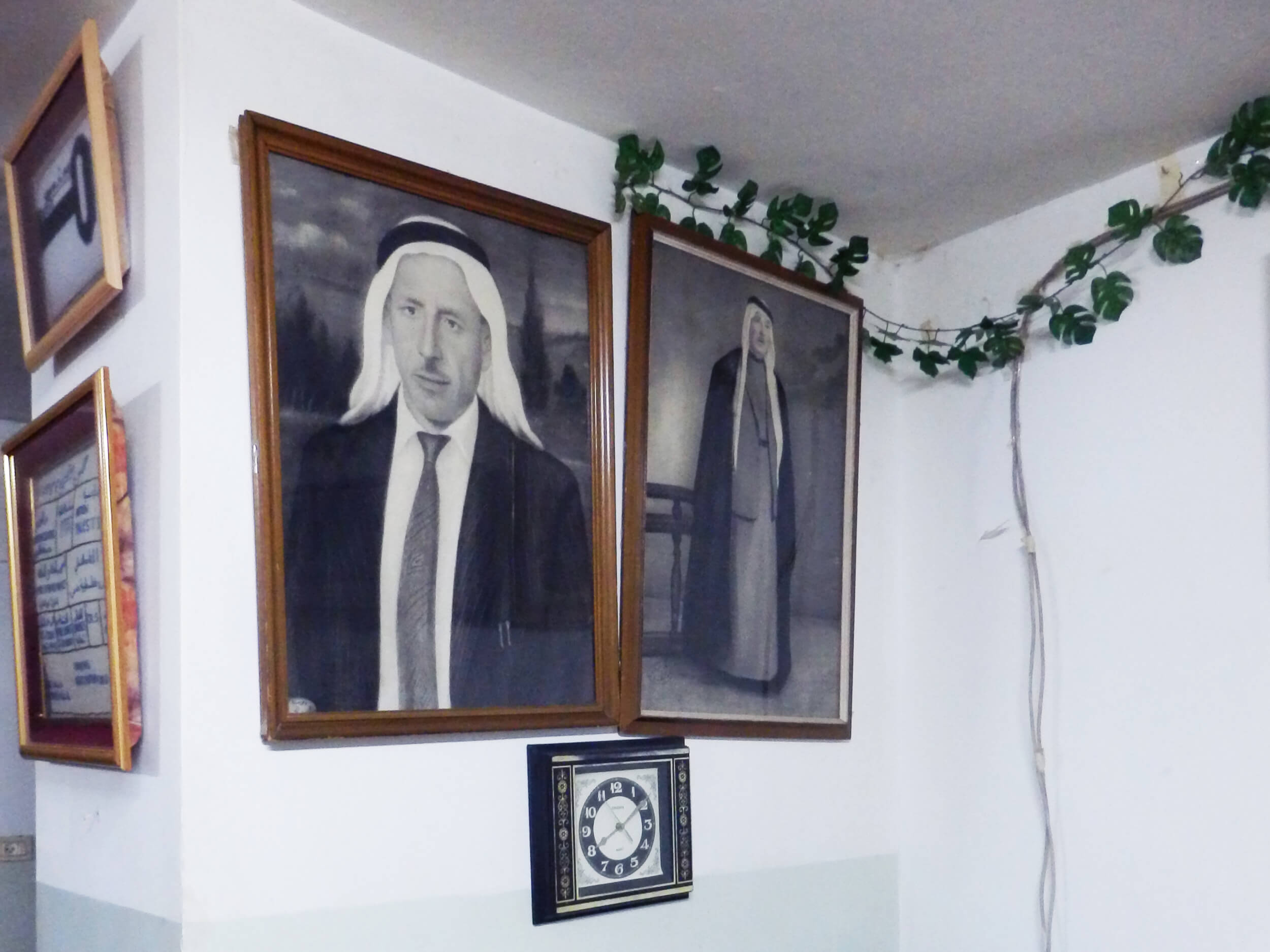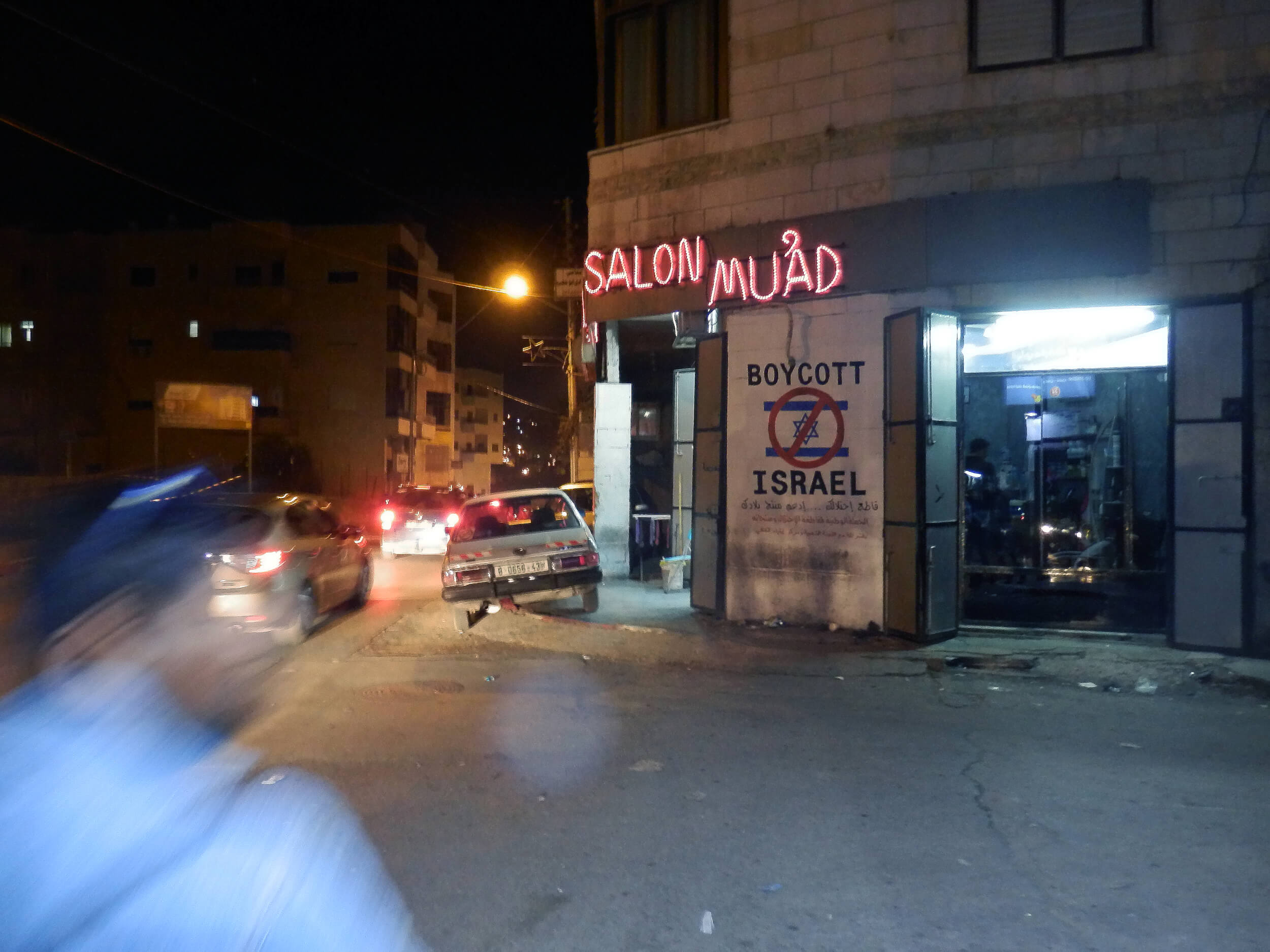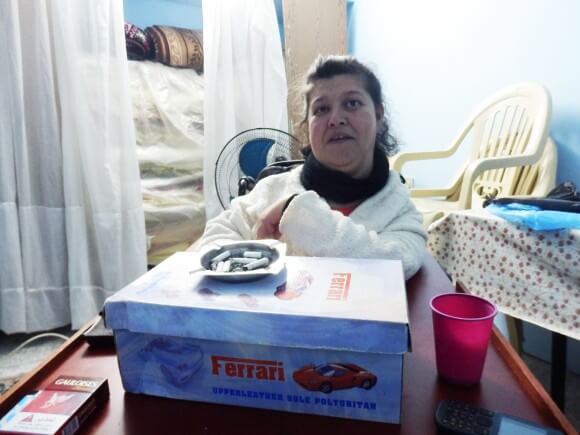When learning Palestinian Arabic, you have to be mindful of the dialects. Despite being such a small geographical area, the differences are pronounced. For example, the letter qaf—the Arabic ‘Q’—is changed to a kaf by people from Bethlehem; to a gaf in the South Hebron Hills; and dropped entirely by people from Jerusalem. So, within fifty kilometres or so, qahwe—the standard Arabic word for coffee—is pronounced at least three different ways: kahwe, gahwe, and ‘ahwe. If you want Arabic coffee in Jerusalem and ask for kahwe arabiyye, you can get a long, uncomprehending look.
For the past three months I have been guided through this complex terrain by my teacher Echlas al ‘Azza. She has an inimitable style, giving lessons that are laced with humour and punctuated by frequent requests to light another Gauloises for her. What makes the experience of learning from Echlas unique, however, is that when you learn with her, you learn in her home in al ‘Azza refugee camp. This means that the lessons are not just about the language, but also an education in the history and culture of Palestinian refugees. Without understanding one, she says, it is not possible to understand the other.
Al ‘Azza is not just the smallest of Bethlehem’s three camps, but the smallest of all Palestinian camps in the West Bank. Its residents live along a single street, six and a half acres of thickly tangled storeys that grow upwards year-by-year. Most of the camp’s residents are from Beit Jibrin, a village near Hebron that was occupied and destroyed by Israeli forces in 1948. The inhabitants fled, and like the vast majority of Palestinian refugees, have not been able to return to their homes since then because of long-standing Israeli government policy. Those refugees who tried to return to their homes after 1948 were violently prevented from doing so by Israeli forces.
Echlas was born in the camp in 1972 with muscular dystrophy and has been in a wheelchair all her life. For the last twenty-three years she has relied on international volunteers to provide her with round the clock care. These volunteers were organised at first through friends, and now Facebook. She tells me that many of these people had heard about Palestine, but did not know the story of the Palestinians’ exile, or have any idea about what life was like for Palestinians now. “I had one girl who was living with me, who realised only after one week of being here that this is a refugee camp! She said to me, ‘but how can it be, there are no tents?’”

Echlas is now well known amongst the internationals who come to live and work in Bethlehem as an experienced and sympathetic teacher, with recommendations passed on by word of mouth. She is unperturbed in the face of my frequent failures to grasp the intricacies of Arabic grammar, an elegant but complicated system that modulates the words depending on who is speaking, and to whom. Her patience and skill is impressive given that she has never received formal training in teaching or English: “it was one of the volunteers that forced me to start teaching. I was afraid that I would make a mistake; I didn’t feel comfortable about it. She was going to Jerusalem for lessons, but she said she understood me better, and insisted I teach her.”
Since 9/11 Echlas tells me that she has experienced a distinct increase in the interest of foreigners in learning about Arab and Islamic cultures, and the languages spoken within them. She is critical, however, of those people who have come to be taught by her who view the language as a modish pursuit, because she sees a strong connection between learning Palestinian Arabic and learning about Palestinian history. “If you just want to learn Arabic, don’t come to Palestine to do that, because there are so many connections between our language and situation. Palestine means a political history, so that means if you come you must learn about Palestine to properly learn the language.” This belief has translated into my lessons by learning vocabulary very different from that of your average language class, such as mustawtaneh (‘settlement’), maseera (‘demonstration’), and ehtilal (‘occupation’). More humorously, she has also taught me to dodge awkward questions about believing in God (or not) by declaring “ana yasaree,” which translates to “I am a leftist.” In politically minded Palestine, that apparently explains everything.

The political engagement of the camp is also visible outside the classroom in the murals that adorn the walls. One painted recently commemorates the second anniversary of the killing of a 15-year old resident of the camp, Saleh al Amareen, by Israeli forces. Another visual reminder of the occupation is the Israeli separation wall and the main checkpoint between Bethlehem and Jerusalem that lie just to the north. These barriers, and the permit system that accompanies them, were set up in the early 2000s and now prevent most Palestinians living in the West Bank from travelling to Jerusalem and beyond. One effect of this closure is that many less Palestinians speak Hebrew today than in previous generations, and—given the power she ascribes to language—Echlas believes that this is mistake. “I think we should teach our kids Hebrew in school, because then we will understand a bit more about the Israelis and the way they think, and perhaps be in a better position in twenty years.” In Gaza, where no permits to work in Israel have been granted since the mid-2000s, the Hamas-led government did just this, putting Hebrew on the curriculum in schools in 2013.
When it comes to teaching Arabic to Israelis, however, Echlas does not feel comfortable, and has turned down requests to do so in the past. When I challenge her on this, asking why she does not think that it would be a good way for her to educate Israelis about the situation of the Palestinians, she tells me that she “will not teach them about what their own government does. When Palestinians can come to Jerusalem without permits, then you can come to my camp.”
Learning with Echlas is therefore more than just an education in Palestinian Arabic, its details and divergent dialects. It is even more than learning about the history and culture of Palestinian refugees. It is a lesson in the power learning a language has to shape politics and people’s engagement in it. For somebody that supports the Palestinian struggle for justice, there has been no place better to learn than the camp.



I have a Palestinian friend from Bethlehem who asked her father
“Are we Christians or Muslims?”
“Who gave you these names” He inquired “We are Marxists”
Greetings,
Brava Echlas.
If we understand eachother, we grasp our Menschkeit.
ziusudra
PS I was doing border patrol in Coburg, Germany in 1959.
My German American Sargent & i stopped off at a Deli. The
sales lady said something to him & i asked him of what she said.
She said, her feet hurt. I froze realizing at that moment that Germans are People. I was 17!